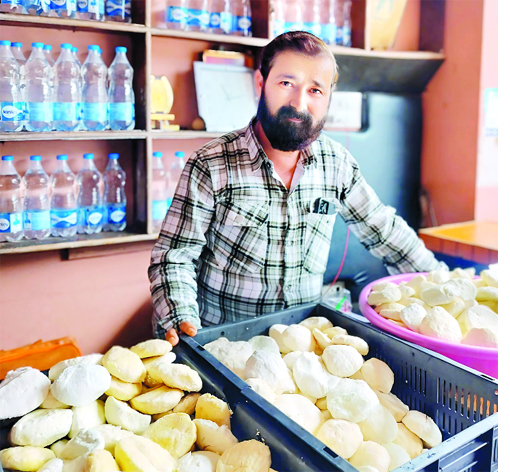Nishikant Khajuria
While travelling on Udhampur to Chenani stretch on the Jammu-Srinagar National Highway, we notice several roadside eateries serving Kalari- a sought after delicacy of Jammu region and popular local snack made of cheese. Among these eateries, `Sham Kaladi’ has a distinction from others because of its quality control, popularity and entrepreneurial spirit of the owner Sham Lal Kerni who is setting example for others.
Situated along the National Highway at Dharmthal, 18 kms from Udhampur town, Sham Kaladi has been an attraction for the commuters for a stopover here to relish this local snack. Besides its other qualities, Kalari of Sham Kerni is one of the few local products of Jammu and Kashmir, which have secured Geographical Indication (GI) tagging from the Government of India under Geographical Indication of Goods (Registration and Protection) Act 1999.
Even as Kalari is also found in towns where it is mass-produced by Halwais to meet the growing demand, the true essence of Kalari is best experienced when made in the traditional manner. The authenticity and unparalleled taste of Kalari are preserved in the hilly areas, where it is prepared with pure milk, dedication, and bright sunshine. The process of making Kalari is labor-intensive and requires a deep understanding of the craft, something that has been passed down through generations.
The production of Kalari is more than just a culinary tradition. It is a vital part of the local economy and culture. The demand for milk to make Kalari has encouraged villagers to keep cattle in large numbers, thereby preserving the livestock culture in these areas. The process of making, transporting, and selling Kalari provides significant employment opportunities, particularly for the youth in rural areas. Many young people have found a sustainable source of income in this profession, contributing to the economic stability of their communities.
One such inspiring story is that of Sham Lal Kerni from Dharamthal. In 1985, Sham Lal started his Kalari business from a modest Karyana (grocery) shop near his house. He traveled extensively to villages such as Chrdi, Kethar, Ladha, Samroli, Pancheri, Mada, Ramnagar, and Chenani, encouraging locals to engage in Kalari production. His efforts paid off as village women began to see Kalari making as a viable source of income. As demand grew, Sham Lal expanded his operations and established an independent unit in January 2000.
Today, Sham Lal’s Kalari business has flourished beyond imagination. He sends Kalari to various parts of India, including major cities like Mumbai, Kolkata, and Delhi, and even to international markets such as Dubai. Tourists visiting Patnitop and Srinagar often stop by Samroli and Dharamthal to savor Kalari- Kulcha, the popular local snack. The success of Sham Lal’s venture has inspired many others, leading to a proliferation of Kalari shops along the National Highway from Udhampur to Chenani, including some registered cooperative societies.
According to Sham Lal Kerni, no compromise with quality of the product is recipe of his success story. “Because of the quality product and hygiene, people love to visit our eatery and relish Kaladi-Kulcha,” he said. While elaborating, Sham Lal said that in 2021, prominent social activist Padamshree Dr Rajni Kant contacted him and encouraged to file application for GI tagging. Dr Rajni Kant has been working for the past 30 years in Uttar Pradesh for sustainable development of weaker sections, especially artisans and weavers. On October 3, 2023, Government of India certified GI Registration to Shyam Kaladi Cooperative Limited. In the process of getting GI tagging, Sham Lal was also facilitated by the J&K Government, particularly, the Department of Dairy & Food and NABARD.
“The Daily Excelsior published my success story, which also helped me a lot in getting popularity and establishing the brand of Sham Kaladi,” said Mr Kerni, adding that he was specially invited to mega Government events, including G20 to display Kalari for its further promotion.
Around 500 people and their families are associated, directly or directly, with the Kalari business of Sham Lal, who is now planning to open a small dairy farm for more production of Kalari to meet the ever growing demand and giving employment to more people.
Pertinent to mention that the rise in Kalari’s popularity has had a significant impact on the rural economy. The employment generated through Kalari production and sales has provided a steady source of income for many families in these hilly regions. The cooperative societies and individual entrepreneurs involved in Kalari production are playing a crucial role in this economic upliftment, demonstrating the potential of traditional crafts and foods to drive rural development.
Kalari’s growing fame has brought a sense of pride to the people of Duggar land. The unique and healthy nature of this cheese has not only made it a sought-after delicacy but also a symbol of the region’s rich cultural heritage. The success stories associated with Kalari, like that of Sham Lal Kerni, serve as a testament to the entrepreneurial spirit of the Jammu locals who need to be further encouraged by the Government machinery and NGOs.


